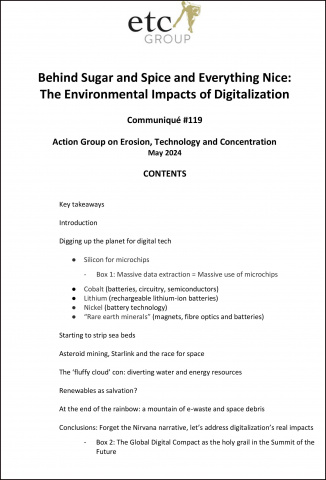Submitted by Ronnie Hall on
The UN is currently hosting a process towards the Summit of the Future (SOTF), scheduled for September 2024, in a bid to promote “multilateral solutions for a better tomorrow”, including through a technology track leading to a Global Digital Compact.
Adding its voice to the debate during the current UN Civil Society Conference being held in Nairobi (9-10 May 2024), ETC Group is contributing a new research report on the stark environmental and social risks associated with digitalization, which must be taken into account in any Global Digital Compact. We have found that digitalization is exacerbating existing inequalities, and is spurring the extraction of resources from land, ocean and even space.
A genuine Summit for the Future must, above all, reverse the current winner-takes-all approach that dominates digitalization and the ‘space race’ at present, favouring military and geoengineering technologies and other forms of Earth manipulation, instead ensuring that all current and future digitalization and space-related technologies are carefully and thoughtfully developed and deployed, with a view to promoting the well-being of all people, our environment and our planet.
—
With digital technologies multiplying around us, Big Tech’s proponents would like us to believe that data, silicon chips, data storage “clouds”, and the other components of the digital realm – including the batteries that power everything – are made of sugar and spice and everything nice.
But nothing could be further from the truth: data is neither ethereal nor harmless. It is resource intensive, made up of sand, water, coal and harmful chemicals, and it generates toxic wastes.
The blurry imagery of the fluffy “cloud” darkens the scary reality of massive data centres siphoning off resources, contaminating nature, and endangering people’s livelihoods and food security.
In this new Communiqué, ETC dissects the digitalization process and reveal its extractive, polluting and material nature.
All of our digital activity is stored in data centres, misleadingly called “clouds” which require an uninterrupted water supply to prevent the servers from getting overheated. From the US to Uruguay, communities have clashed with Big Tech for constructing data centers in drought stricken areas. If we add up the water use in extracting and processing critical minerals and rare earths, the overall water consumption of the digitalization industries is staggering.
Operating data centers and transmitting data across networks also imply massive fossil fuel consumption. The International Energy Agency (IEA) estimates that, together, data centres and data transmission networks globally accounted for 2-3 per cent of global electricity use in 2022. Consider that the whole of the African continent consumed about the same amount of electricity in the same year. And contrary to what Big Tech is telling us, renewables are unlikely to solve this rapidly spiraling energy demand from data centres.
In addition, digitalization assumes the expansion of the extractive sector. For example, semiconductor chips are ubiquitous across the digital realm and are integral to all electronic devices, from laptops, phones and televisions through to farm machinery, automobiles and aeronautics. To make chips, you need pure-grade silicon (also called “digital gold”). Other critical minerals – such as lithium, nickel, cobalt, manganese and graphite – are needed to manufacture the batteries that power electronics and digital tools, drones and electric vehicles, and to store renewable energy. The manufacturing units for these chips are built on large plots of land and their workers have been documented as having been exposed to harmful chemicals.
The proliferation of digital technologies is also generating vast mounds of e-waste, a large quantity of which is exported to the Global South where chemicals like mercury and flame retardants are released into the environment and impact the health of exposed workers and communities.
The more you learn about it, the more you realize that digitalization leads to the displacement of communities from their lands and livelihoods, endangering their food security, and exposing them to harmful chemicals putting their health at risk. Digitalization is exacerbating existing inequalities, and is spurring extraction of resources from land, ocean, and even space.
It is essential that communities whose lives are impacted by these technologies need to actively participate in evaluating their social, economic and environmental impacts before they are deployed.
All involved in negotiations on a Global Digital Compact need to recognise that current and future digitalization technologies must be carefully and thoughtfully developed and deployed, with a view to promoting the well-being of all people, our environment and our planet.
Read our new Communiqué: Behind Sugar and Spice and Everything Nice: The Environmental Impacts of Digitalization
| Attachment | Size |
|---|---|
| 417.23 KB |

